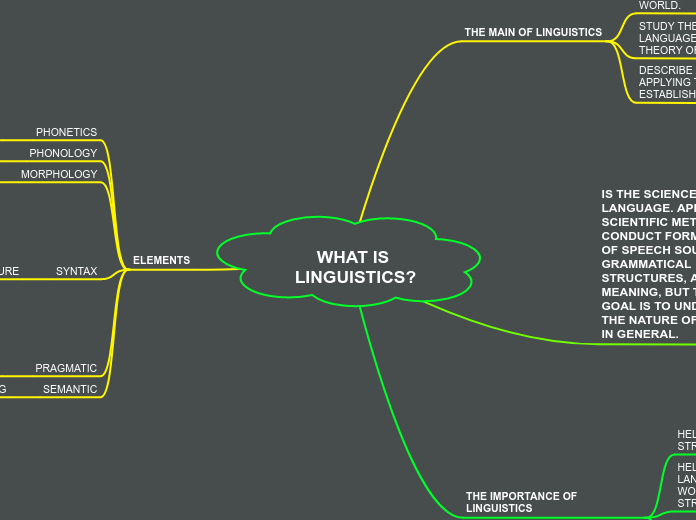LINGUISTICS
Is the scientific study of language. How it is put together and how it works.
Phonetics:
1.- /t/ is a voiceless dental phoneme
2.- /m/ is a voiced labial phoneme
Phonology
1.- The use pf the phonemes /k/ and /p/ in Cut and Put
2.- The use of phonemes /B/ and /b/ in Boys and Voice
Morphology
1.- Unbreakable: UN= no Break=root Able=That can brakes
Unbreakable= Something that doesn't have the ability to brake.
2.- Pointless: Point= root Less=Suffix for absence
Pointless= Something that does not have a point.
Syntax
1.- In English we can say: Marie is playing the drums. (S+V+C)
2.- In Spanish we can say: Maria toca el tambor; Maria el tambor toca; El tambor lo toca Maria; El tambor es tocado por Maria. etc.
Discourse analysis.
Semantics
1.- He called me yesterday to ask me out.
2.- She called at my door yesterday.
Pragmatics
1.- _Are you dating?
-It's not a sin. (So, are they?)
2.- Did you make your homework?
-We were supposed to send it yesterday.
Historical Linguistics
1.- The Spanish speakers in latin america have stopped using Vosotros.
2.- Ecuadorians stopped referring to each other by "su merced" as they used to do years ago.
Sociolinguistics.
1.- Slang such as "Dude", "slay", "On fleek" is used by young americans.
2.- Slang such as "Shady", "The Tea", "Sickening" are mostly used by the LGBTQ comunity.
SOCIOLINGUISTICS
It is the study of society and language and how it affects each other
PRAGMATICS
It involves the study of how speakers of a language use the language to communicate and accomplish what they want.
DISCOURSE ANALYSIS
looks at bigger chunks of language - texts, conversations, stories, speeches, etc. Different types of these use language differently, and there can even be differences in how a language is used based on the genre.
MORPHOLOGY
Looks at how individual words are formed from smaller chunks of meaningful units called morphemes.
PHONETICS
Study of the sounds of speech and how they are made and produced in the body.
HISTORICAL LINGUISTICS
Is the study of how languages have changed over time.
SEMANTICS
Is the study of meanings.
SYNTAX
Is the study of how phrases, clauses and sentences are constructed and combined in particular languages.
PHONOLOGY
Uses phonetics in order to see how sounds or signs are arranged in a system for each language.









